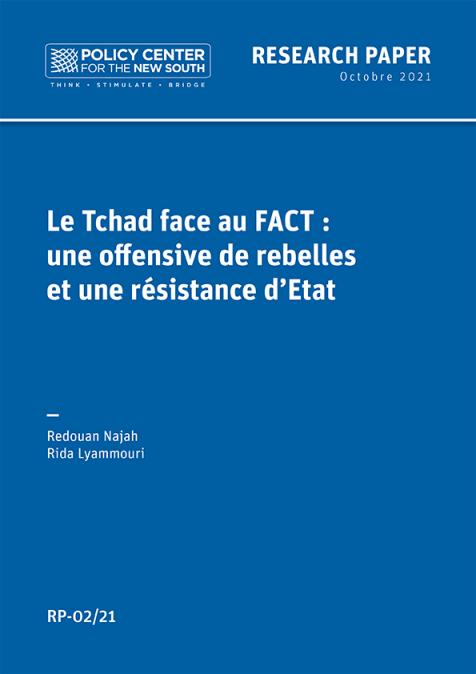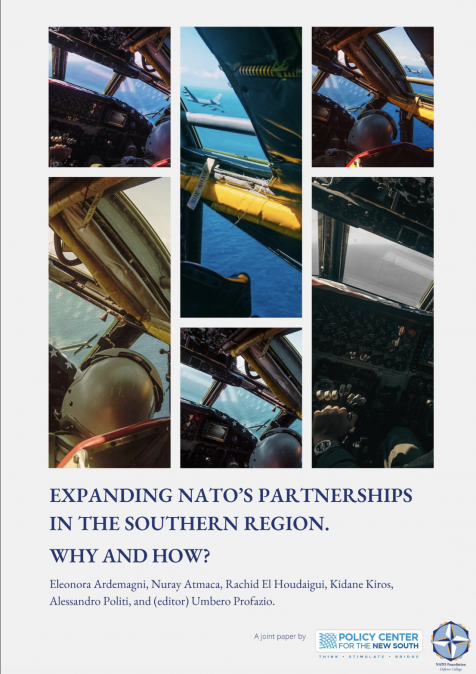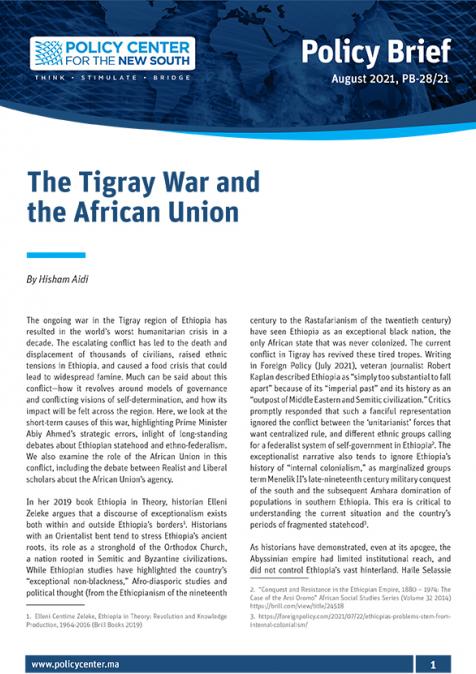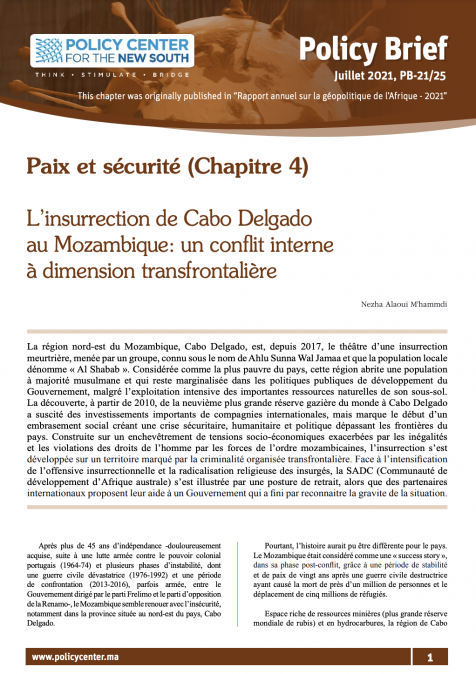Publications /
Opinion
Recep Tayyip Erdogan was humming and he had reason to feel joyful. His people had entrusted him with reforming their constitution, which would give him more power, incredible power. Possibly, he could realize his dream after all, the revival of the Ottoman Empire. Such Turkish power last seen in the era of Osman I at the end of the 13th century in northern Anatolia. A neo-Ottoman, is it a vision of a megalomaniac?
Would Saudi Arabia ever be willing to be ruled by a Turk? A Turk who is the descendant of the Ottomans, the same Ottomans who captured Mecca and Medina and executed Saudi leaders as far away as Istanbul? Saudi Arabia had to revolt to be free of Turkish colonialism, aided by the British during the First World War, becoming an independent kingdom only in 1932.
Would Egypt’s rulers accept an ally of the despised Muslim Brotherhood? The brotherhood of an Islamic religious and political organization, opposed to any sort of Western influence and involved in terrorist activities? One of their leaders was elected President, but driven from power by a coup.
Will radical mullahs in Tehran give their blessing to the ambitious Turk? A NATO member, who bought, in 2017, the sophisticated S-400 air defense system from Moscow. The price: 2.5 billion dollars, 45 percent up front, 55 percent credited as a loan. Must be a joy for NATO that a partner is cuddling up with the potential enemy based in Moscow.
It’s not just the weapons: In April, Putin visited Ankara for the ground breaking ceremony of the “Akkuyu Nuclear power plant” project, a 20 billion dollar affair, paid for by Moscow, constructed and operated by Rosatom, the Russian state nuclear company, which will complete the project by 2023, 100 years after the official establishment of the Turkish Republic. The Neo-Ottoman dream by then?
In another example of Turkey acting outside the usual province of established Western institutions, stated the Wilson Center, the Iranian, Russian, and Turkish Presidents held trilateral talks in Ankara on April 4 in an attempt to try to solve the inhuman Syrian conflict. Though the meeting was hosted by NATO member (since 1952), Turkey, it was not held under the auspices of the UN or the EU.
“This is the first time since the Second World War that a meeting like this was held without the approval of the UN. They are determining Syria’s future without any American representative.”
Israeli defense minister, Avigdor Liberman, observed.
Rahim Rahimov, author of the Wilson Center paper on the Putin-Erdogan relations, reports that controversies and disagreements persist among these three unusual allies (Iran, Russia and Turkey). A few days after the Putin visit to Turkey, Sergey Lavrov suggested that Ankara should hand over control of Syria’s Afrin region (which is currently controlled by the Turkish Armed Forces) to Damascus. Erdogan refused immediately. Moreover, the Turkish President unambiguously supported recent US-led strikes against Syria, while Moscow staunchly condemned them, charging they demonstrated “blatant disregard for international law.”
Author Rahimov writes: “For now Turkey’s noninstitutionalized relations with Russia are burgeoning, whereas the institutionalized relations with the west are deteriorating.”
Three years ago, Erdogan was considered an outlaw by Moscow, especially after a Turkish combat jet shot down a Russian SU 24, which supposedly entered Turkish airspace without permission. Vladimir Putin deplored the act, condemning it as a “stab in the back delivered by accomplices of terrorists.”
Who were the “Turkish officials,” accused of financial interests in Islamic State oil deals?
“IS has big money,” Putin said, “hundreds of millions or billions of dollars from selling oil. They are protected by the military of an entire nation.” Unnamed. Your guess. One can understand, Putin declared, “Why they are acting so boldly and blatantly. Why they commit terrorist across the world, including in the heart of Europe.”
Ankara, an accomplice of oil deals, an accomplice of murder, supporting ISIS? Moscow imposed a number of economic sanctions on Turkey, suggesting to Russian tour operators not to send charter flights with Russian tourists to Turkey anymore. Russian football clubs were not allowed to sign Turkish players. Visas were introduced for Turks travelling to Russia. The day after the jet was shot down, a Russian lawmaker introduced a bill to the Russian parliament that would criminalize the denial of the “Armenian Genocide,” a political move that Turkey had strongly opposed when countries like France and Greece adapted similar laws. It took Erdogan seven months until he was ready to express regret about the incident in the sky. A few months later though, the Turkish leader apparently recovered his composure. Erdogan told his Ukrainian colleague, Petro Poroshenko, that Turkey would not recognize the 2014 annexation of Crimea, calling it an “occupation.”
COULD THE EMIR FINANCE THE ERDOGAN OTTOMAN EMPIRE DREAM?
Erdogan is supporting, mainly verbally, the Palestinians and Hamas, not political heavyweights but rather forgotten cousins in the Arab world, these days used mainly for Anti-Israeli propaganda.
Who was the only Arab leader sitting in the Presidential Garden at the inauguration of the Turkish leaders Presidency a few weeks ago? The Emir of Qatar, one of the tiniest of all tiny emirates, or sheikdoms. Arab enemies, led by Riyadh, surround his country. A blockade, because Qatar was accused of financing terrorism and being too close to Tehran, the evil, aggressive Shiites.
Saudi Crown Prince Mohammed bin Salman referred to Turkey as part of a “triangle of evil,” consisting of Iran and Islamist extremists. Could the Emir be, one day, the potential financier of the Erdogan Ottoman empire dream? Didn’t Erdogan declare, almost speaking to himself, “your targets can only be realized on the basis of dreams?”
Yes, one day he could be the Sultan of Turkey and the Caliph, the chief Muslim civil and religious leader, regarded as the successor of Muhammad. What a career for an almighty President, whose father was working as a coastguard at the Black Sea, humble and devoted to the Prophet.
In Erdogan’s mind, the return to 1924 could be feasible, the year the founder of modern Turkey, Mustafa Kemal Ataturk, abolished the caliphate. A tragedy for nationalists, who were forever proud of their nation’s power and glory in the mid-16th century, dominating the eastern Mediterranean and threatening central Europe, even capturing Constantinople in 1453. One of the first visits of Recep Tayyip Erdogan, after his referendum victory last year, was to the tombs of leaders of the Ottoman Empire.
THE KIDS OF CASABLANCA WANT TO DRIBBLE LIKE MESSI
Erdogan, a Sunni Muslim, recited and hummed koranic verses, one from the first surah:
“Guide us on the straight path. Not the path of those who have brought down wrath, not those who wander astray.”
For the longest time, the Turkish President remained before the tomb of Selim I, the sultan who conquered Medina and Mecca, and in 1517 defeated the Mameluke Sultanate in Egypt and thus became the Caliph of the entire Muslim world. A dream of revival. The glory of his nation, which has been struggling for years to be accepted by the European Union.
Erdogan has a dream, just like Martin Luther King had a dream, or like the kids in Casablanca or Palermo have dreams, they want to dribble like Messi and score goals like Ronaldo… And drive a Ferrari.
Erdogan, 15 years in power as prime minister and President, thrives for a different form of grandeur. His Presidential palace is a copy of the White House, a price tag of 600 million dollars for a humble 1100 offices, and private accommodations, which, for the New Yorker “bespeak a monarch whose sense of importance has begun to border on the absolute.”
A new airport, calculated as a 13 billion dollar project, is being built near Istanbul, supposedly projected to be the busiest airport in the world in ten years. Six runways, 200 million passengers yearly. A 28 mile canal from the Black Sea to the Sea of Marmara is trenched (for 12 billion), and since modesty is not part of the Turkish President’s understanding of himself, he has announced that eventually Turkey will develop, under his guidance, into “one of the ten biggest economies of the world.”
Who cares that he never studied economics? After all, he was the respected mayor of Istanbul, in early days a football player, and when he was chosen as Prime minister, Europe’s politicians were courting him as a moderate Muslim, possibly willing to be the bridge between orient and occident.
Arab leaders, except the Emir of Qatar, are shying away from the unpredictable autocrat. Who celebrated with Erdogan his inauguration, any world leaders? Dimitri Medvedev, the shadow of Putin, sure, the President of Bulgaria, and the leaders of Somalia, Sudan, Chad and Pakistan. Any Europeans? A prince, a duchesse? Who travelled from the Americas? Washington? Ah, yes, I almost forgot, Nicolas Maduro of Venezuela, who certainly shares Erdogan’s vision of democracy, the limits of freedom or political demonstrations. The suppression of a free press. Justice. Independent judges. Critics attribute to Erdogan a quotation, which they deem credible and true: “Democracy is like a train. You get off once you have reached your destination.”
“THE NATION AT A GROWING RISK OF SLIDING INTO A FINANCIAL CRISIS”
Ever since the failed coup d’etat in 2016, Mr. Erdogan had opened the credit taps to ensure continued economic growth, which the Central Bank sought to restrain, lifting rates to stabilize the lira to contain inflation. This suggestion has provoked the wrath of the President, revealed the New York Times; Mr. Erdogan has claimed that inflation is actually the result of high interest rates, “which is not unlike asserting that chemotherapy causes cancer.”
Before the elections, the Turkish leader threatened to assume control of the Central Bank and to abolish high rates. Investors took that as further impetus to flee, pushing the lira down to a record low, losing one fifth of its worth this year alone. Erdogan has wielded his influence to deliver relentless economic growth through unrestrained borrowing, lifting debt levels to alarming heights. The Turkish leader, who appointed his son in law, Berat Albayrak to be minister of finance, possibly encouraged by additional authority, will test the limits of economic reality even further—who wants to stop him?
Growth in Turkey, no argument is one of the fastest on the planet, 7.4 percent last year, but international economists observed that this was only achieved by potentially unsustainable borrowing, particularly for the vast infrastructure projects. The result: at the end of April, Turkish private sector companies owed more than 245 billion of foreign debt, or nearly one-third the size of the country’s overall economy. Economists predict that Turkey could be the next nation to disintegrate, since the ambitious nation shows all the ingredients of “the beginning of a failed state.”
ABSOLUTE RULER, NOT YET A DICTATOR
At the same time, Turkey, judged Foreign Affairs, has “moved into a profoundly illiberal, authoritarian direction-although not towards repressive Islamism.”
Rather Erdogan, who obtained about 52 percent of the vote in the Presidential election, but failed to secure the absolute majority in parliament, has become something more akin to a traditional Middle Eastern strongman: consolidating personal power, purging rivals, and suppressing dissent.
After the failed coup, the crackdown of the Turkish leader was swift and merciless - a sweeping purge of army and state bureaucracy. In fact, more than 100,000 people were arrested under a state of emergency, media outlets were shut down and thousands of academics and journalists were jailed being charged with ‘terrorism’ or ‘affiliation with opponents of the nation.’ Moreover, hours before his inauguration early July, Mr. Erdogan dashed off a decree ordering the firing of another 18,000 state employees, most of them members of the police and army, but also teachers and university professors.
Erdogan is the absolute, authoritarian ruler of Turkey, although not (yet) a dictator. 86.2 percent of the eligible voters did place their ballot and gave the social democratic “Republican People’s Party” 31 percent of the vote, the best result in 40 years. He also assured the pro-Kurdish “People’s Democratic Party,” whose leader Selahattin Demirtas has been jailed by Erdogan almost two years ago (on invented charges of terrorism), 10.7 percent and 59 seats in the 600-seat parliament.
The right has gained mass support by recasting class conflict and culture war. Peasants, workers and those in the lower middle class have rallied to populist conservatives who appeal to their religion and their resentment of the urban elite— at the referendum last year, neither Istanbul nor Ankara gave Erdogan a majority. The Turkish leader is pursuing a radical, repressive style of politics, including the rejection of democratic principles. Because of the constitutional changes narrowly approved last year, Erdogan is now controlling the legislature and judiciary through sweeping executive powers, by introducing law by decree, personally selecting five of thirteen Supreme Court judges, and adding the possibility for two additional five-year periods in power. He even granted himself the right to dissolve parliament. The European Union ministry, which worked on Turkey’s membership negotiations with the Union, has been abolished and its remnants have been attached to the Foreign Affairs ministry. Nine policy boards will specialize in areas like health and social policy. Sixteen ministers, most of them technocrats, are chosen by Erdogan. From now on Turkey’s President, the New Yorker reported, will stand firmly in the ranks of authoritarian leaders around the world, among figures such as Hungary’s Viktor Orban, Andrzej Duda of Poland, “who are using the cover of elections to undermine the other institutions that make a liberal democracy work.”
The apparent attempt by Turkey, possibly part of the Ottoman-dream, to expand its military presence in the Middle East, is raising alerts in Saudi Arabia, the United Emirates and Egypt. In fact, Ankara has established military bases in the region in places including Qatar, Somalia and, possibly even a naval base in Sudan, directly opposite Saudi Arabia, across the Red Sea and therefore constituting a potential threat to Egypt.
Many Arabs, writes W. Robert Pearson of the Middle East Institute, “resent Turkey’s attempt to establish neo-Ottoman influence in the region.” The Saudi crown prince, preoccupied with the influence and military power of Iran and involved in a destructive, inhuman war in Yemen, is equally concerned about the restless leader in Ankara, who is showing loyalty to Qatar, including sending up to 3000 troops to strengthen his friend.
“FIXED” OR “TOTALLY DESTROYED”
When Riyadh decided to break diplomatic relations with its neighbor Qatar and initiated a blockade, Turkey almost immediately started to deliver food to Doha, and, by now, has organized an alternative route towards the encircled Qatar with the help of Tehran, another enemy of the Saudis.
In 2017, Ankara and Tehran signed a deal to break the Saudi trade sanctions against Qatar, an ally of the United States. Washington, occupying an airbase in Qatar used for attacks on enemy forces in Syria and Iraq, sided with the Saudis, who recently ordered weapons worth over 100 billion dollars in Washington. Such purchases will move any reluctant President to take sides. Nevertheless, Erdogan was not afraid to provoke a showdown with the US, which demanded Ankara not to attack its closest allies in its fights against ISIS in Syria, the Kurds.
Washington warned that their units would return fire if attacked. Ankara insisted that the US not only end cooperation with the Kurdish units, but also recover the heavy weapons it provided to them, as it supposedly promised to do after the war against Islamic State. Ankara publicly declared that the relationship with Washington had reached a “critical point” that would either be “fixed or “totally destroyed.”
In the meantime, Ankara has succeeded in closing off the 911-kilometer stretch of border between Syria and Turkey—seven-ton concrete blocks, two meters wide and three meters high, the second longest structure in the world, after the Great Wall of China.
In 2011, Erdogan was so eager to see Bashar al- Assad fall, that he threw open the borders, allowing thousands of jihadists to pass into Syria. Only in 2015, at the urging of Obama, did the Turks join the international coalition against ISIS, which (just like Erdogan) dreamed to establish a caliphate on liberated Arab land.
12 DAILY FLIGHTS FROM TEL AVIV TO ISTANBUL
Turkey supported the rebellion against Assad, just like the Saudis, which fear the advance of Hamas (also supported by Ankara), Hezbollah and other Iranian troops, which, seemingly, are not in a hurry to evacuate their bases and positions in Syria or Iraq. When Ankara forces attacked the Kurds, Assad even sent pro-regime militias to aid them. Moscow’s Foreign minister, Sergey Lavrov, made Erdogan an offer the Turks refused: “Turkey’s security concerns can be met through direct dialogue between Turkey and Syria.”
Just a rather complicated scenario in this part of the Middle East. Rather chaotic, as well. Ever shifting alliances persist in a permanent denial of reality. The Crown Prince of Saudi Arabia, pleading publicly to accept the recognition of Israel (and dealing secretly with Jerusalem, which was accepted, in one way or the other) by Riyadh as the capital of Israel.
Turkey sides regularly with the Palestinians, accusing the Israelis of “state terrorism,” “genocide,” and “crimes against humanity,” after repeated attacks in Gaza and other deadly interventions. Erdogan just ‘forgot’ that Turkey was the first Muslim nation to recognize the state of Israel, and was(is), despite the rhetoric, deeply connected in military deals, booming economic relations and tourism with the Jewish state-for years. Istanbul and the beaches of Turkey were (and are) tourist attractions for Israeli citizens.
EXIT ISRAEL
In 2005, the Turkish leader visited Israel, and laid a wreath at the Holocaust memorial. He told his Israeli colleague Ariel Sharon that his “Justice and Development Party,” regarded Anti-Semitism as a “crime against humanity.” Apparently, he added that Iran’s nuclear ambitions were a threat not just to Israel, but also to the entire world. Four years later, Israel discovered large reserves of natural gas off its Mediterranean coast. Instead of working with Cyprus and Greece, Tel Aviv has been collaborating closely with Ankara, which at a time acted as a mediator between Israel and Syria to create a pipeline into Turkey. The prospect of this energy partnership, reported The National, has helped smooth the political tensions between the two countries that had bubbled to the surface in the past years.
On July of 2017, Bloomberg reported that Turkey was pushing Israel to lean on Cyprus in the hopes of persuading the Cypriots to allow a pipeline connecting Israel and Turkey to pass through their territory. The economic partnership, though, is not limited to natural gas. As the result of the Syrian civil war, Turkey has been using Israel’s Haifa port as an important gateway to landlocked countries such as Jordan. Turkish goods used to flow through Syria, now they go through Israel. Turkish Airlines, and low coast carrier Pegasus, schedule daily as many as 12 flights from Tel Aviv to Istanbul. That is one part of Turkey’s opportunistic Real Politik. The other is meant for consumption by the Muslim masses.
Ankara’s engagement for Palestine: when Trump designated Jerusalem as the capital of Israel, Erdogan hosted an emergency summit of “Islamic Cooperation” in Istanbul. At the end of the conference, Turkey announced it would recognize East Jerusalem as the capital of Palestine… And open an embassy.







